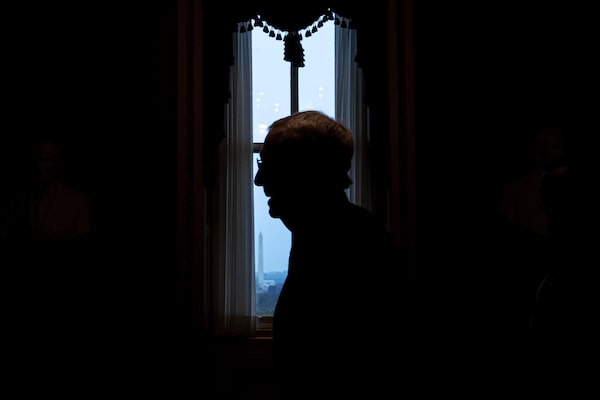
Senate Minority Leader Mitch McConnell departs the Senate chamber on Feb. 28 in Washington, DC.Nathan Howard
Henry Cabot Lodge single-handedly kept the United States out of the League of Nations. Robert Taft was the most important voice of conservatism in the early 1950s. Mike Mansfield later became the most influential American ambassador to Asia in history. Howard Baker Jr. eventually served as White House chief of staff. Bob Dole ran for vice-president and president. Lyndon Johnson served as both vice-president and president.
All of them were deeply consequential Senate majority leaders, giants in both Washington and in their times. But the longest-serving Senate party leader in American history – and arguably the most powerful, with perhaps the most substantial legacy – is Mitch McConnell, the Kentucky Republican who announced Wednesday that he will step aside from the position in November.
The retreat of Mr. McConnell, who turned 82 last week, from the front desk by the aisle of the Senate chamber to a less visible, and far less influential, seat will change not only the character of the Senate but also that of the Republican Party more broadly.
The Republicans whose outlook and approach match those of the rebels in the House of Representatives very likely will ascend, bringing to the Capitol a new generation of Senate leadership and a new view of the function of the legislative branch.
Owlish in appearance and often obstructionist by inclination, Mr. McConnell assured that Barack Obama didn’t get the chance to seat Merrick Garland, now attorney-general, on the Supreme Court. He reversed the argument he employed to keep Mr. Garland off the court to assure that Amy Coney Barrett, Donald Trump’s last nominee, won confirmation to the bench.
He was a reliable ally of George W. Bush and, for most of his administration, Mr. Trump. He was a persistent irritant to Mr. Obama, who mixed respect and loathing for Mr. McConnell in part because of his 2010 statement that: “The single most important thing we want to achieve is for President Obama to be a one-term president.”
Mr. McConnell regularly imposed rigid discipline on his Republican caucus – weakened only in recent years by the emergence of a new brand of Republicans, no longer tied to the hoary credos of the historical GOP, contemptuous of the old get-along-by-going-along ways of Capitol Hill, and defiant of the cult of seniority that for generations ruled the chamber.
The combination of the ascendancy of that new group and the transformation wrought by Mr. Trump in the Republican Party became a challenge not only to Mr. McConnell’s way of doing business but also to Mr. McConnell’s prospects of retaining his position as party leader when the new, 119th Congress convenes early next year.
His chances of surviving that selection process diminished each time he came to the defence of continued American economic and military support to Ukraine, each time he engaged in his trademark skeptical rise of an eyebrow at Trump-oriented initiatives, and each time cable news outlets reran Mr. McConnell’s floor speech declaring Mr. Trump “practically and morally responsible” for the Jan. 6, 2021, riot at the Capitol.
It did not help that Mr. McConnell tripped at a Washington airport in July and then, in the same month, suddenly froze in mid-comments during a Republican leadership news conference. Those moments of physical vulnerability were remorseless indications of his political liability at a time when Americans were recoiling at facing an election between two candidates over the age of 76.
“Mitch has been the most consequential United States Senate majority leader and the leader of the centre-right Republicans in this country, which is still the largest, though not the nosiest, group of Republicans,” said former GOP senator Lamar Alexander of Tennessee, who at age 29 was urged by Howard Baker to get to know the bright 27-year-old legislative aide to then-senator Marlow Cook of Kentucky, beginning a lifelong friendship that became a Capitol Hill alliance.
“For the foreseeable future, he may still remain the most indispensable member of the Senate,” Mr. Alexander said Wednesday.
Unlike Mr. Baker, revered on both sides of the partisan aisle and remembered today for his warmth and humour, Mr. McConnell did not rise to, nor keep, his position, by dint of a strong strain of congeniality. It was the seniority he earned during nearly four decades on Capitol Hill and the severity of his approach that allowed him to win, and then retain, his position.
His influence was sealed inside his party by his recondite opposition to Democratic notions, his incomparable ability to see the cracks in legislative procedure that permitted him to thwart his opponents and advance his allies, and his unbending partisanship.
It was those qualities that were prized by his Senate colleagues and by Republican presidents even during his 11 years as minority leader when his party was out of power in the Senate. But it was also those qualities that won him the enmity of his Democratic rivals.